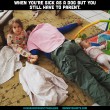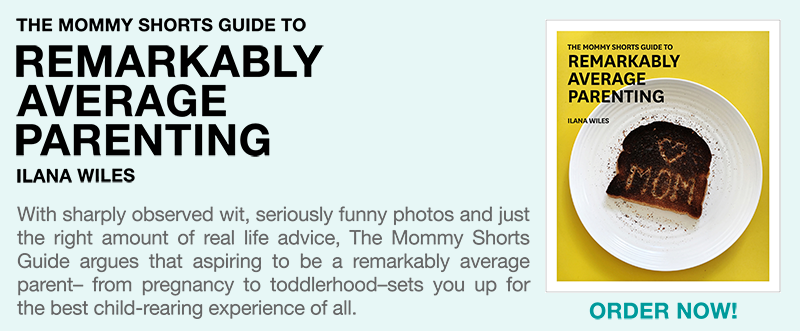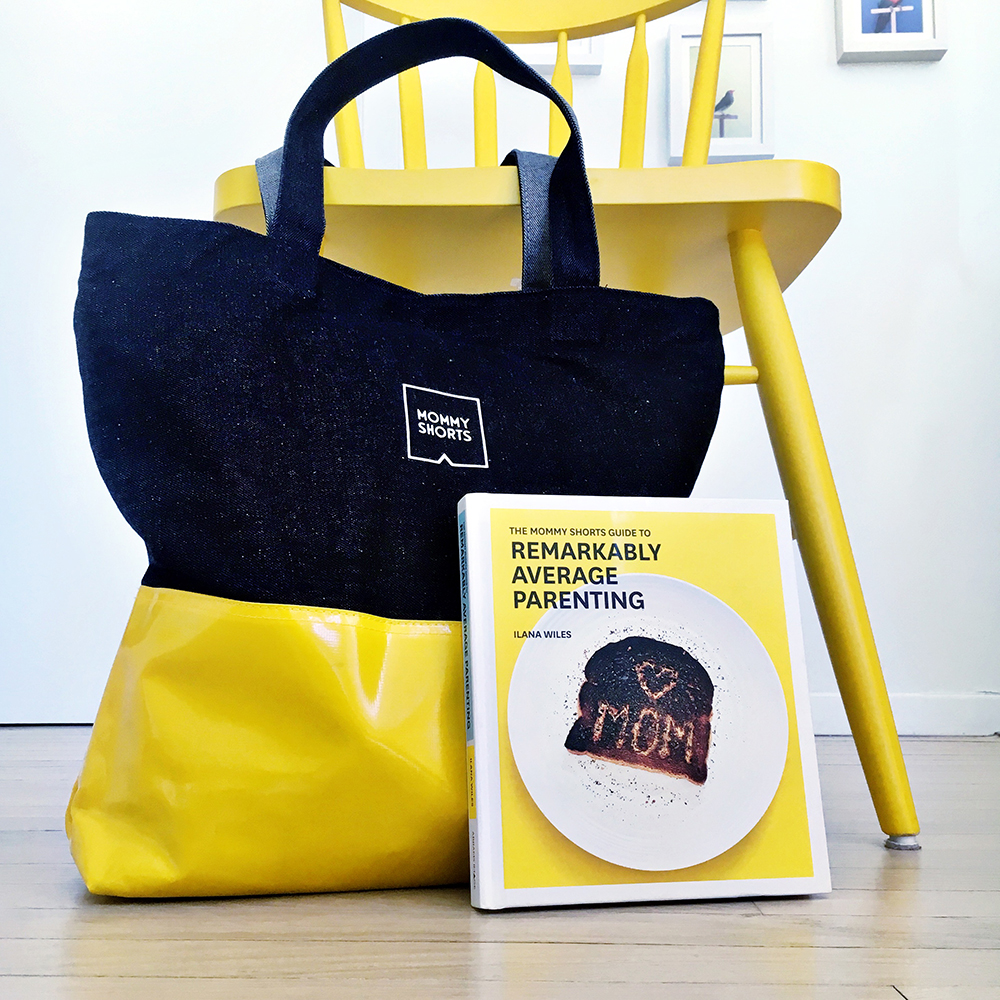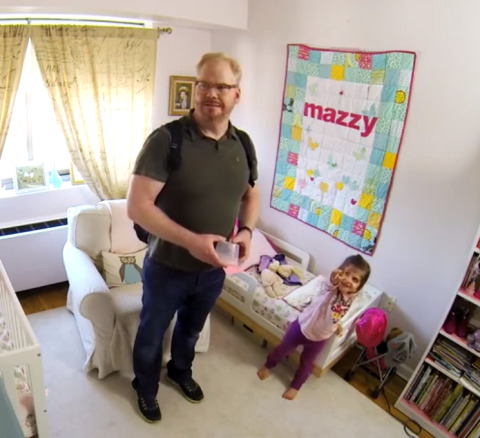“Conversations with your Kids” is a series in partnership with Responsibility.org, an organization that encourages parents to establish open lines of communication with their children, particularly around the issues of peer pressure and underage drinking. Each post will explore a specific topic with expert tips from Dr. Deborah Gilboa (Dr. G) on how to address these topics in an age appropriate way.
Last week, after four days of cake-filled birthday celebrations that culminated in a huge cupcake, Harlow threw up. On the plus side, I got to say, “You know how I always tell you that if you eat too many sweets, you’ll get sick? Now you know I was telling the truth.” The girls nodded with their eyes wide, fully understanding for the first time that sweets might taste good but they are definitely not healthy, just like their parents have said all along. I actually think this experience will come in handy and I see myself using it again and again.
When I posted this on Facebook, one mom said, “Wait until your kids are a lot older and the lesson is about drinking!” Point taken. It is pretty similar, although obviously with much more serious implications. But just like with sweets, it’s best to educate your kids on the pitfalls early and often.
DR. G’S TIPS ON HOW TO TALK ABOUT ALCOHOL WITH OUR KIDS
1. What’s in your glass? Before we start talking to our kids about alcohol, we should ask ourselves what our own feelings are about alcohol. Does it comfort you or scare you? What place do you think alcohol should have in your life? What are the risks and advantages to drinking? It’s much easier to talk to our kids once we know what we think about alcohol, or any subject.
2. What do you want your child to know? Each conversation with your child is a chance to give one message. One phrase that will stick with your child after you’ve talked. Parents are the leading influence on their child’s decision to drink—or not to drink—alcohol, so think about their age and what you’d like them to learn right now. For younger kids, it’s a simple as, “Alcohol is bad for your young brain.” For older kids, it might be, “Alcohol affects your decision-making ability and could lead to bad, potentially dangerous, choices.”
3. It’s not One Big Talk. The best news for parents is that we will talk to our kids about drinking dozens of times. We can let go of the pressure to get in all the information at once, or get the conversation perfect. Neither of those things are possible, and neither are needed! Instead, look for lots of opportunities to ask your child a question or say a few words about drinking. In that way you’ll slowly drip your beliefs and messages into their minds. Over time, your messages will make a big difference!
4. Alcohol isn’t for kids. Many of us were raised “sipping.” The belief was that letting kids taste beer or wine or liquor would make it less forbidden and make them less likely to experiment later. Well, that turns out to be only half true – it does make alcohol less forbidden. Research shows that kids who sipped alcohol before 6th grade are 5 times as likely to have a full drink on their own by 9th grade and 4 times more likely to binge drink or get drunk in high school.
5. Don’t be afraid to say no. Just because you shouldn’t let your child taste your drink, that doesn’t mean you can’t have it in front of your kids. Drinking in front of your kids is actually the perfect opportunity to model the responsible behaviors you want your kids to practice if they choose to drink as adults. Discuss who will be the designated driver within earshot of the kids, and explain the importance of eating before drinking or switching between alcoholic and non-alcoholic drinks.
6. Ask your child questions. The best way to engage an older child or teenager in a conversation about risk is to ask what they think. “What do you think about kids your age drinking alcohol?” or “What is good and bad about drinking?” These are excellent ways to find out what your child already believes and about their point of view. Then you can focus your message to bridge the gaps between you, or just talk about why you agree. If your teen has a question about alcohol and its dangers, you may not know the answer. Don’t feel like you have to have an argument without enough information. Instead, model resilience by saying – let’s go find a reputable website and get the answer to that.
7. Name alcoholism. Many of us live in families with the disease of alcoholism. Our children often see the results – whether in someone’s dangerous or bad behavior, or just in the absence of that person at family gatherings. Instead of ignoring that problem, it’s healthier to answer our kids’ questions. Alcoholism is a disease, and saying so can make the risks clearer to kids while promoting a culture of open communication. “Uncle Sean has a disease called alcoholism. When he drinks it affects his body and his brain so that he can’t control his behavior.” It’s important for kids to learn that for some adults, even though it’s legal, drinking alcohol might not be a good idea.
8. Being a non-drinker doesn’t make this a non-issue. If you are raising kids in a home without any alcohol, it can be easy to avoid this topic. Seize opportunities in everyday life – celebrity behavior, news coverage, TV shows or movies – to talk about the dangers of underage drinking and why you have a dry home. Not mentioning it and just not drinking will only give kids part of the story, and will not give them the skills they need to become responsible drinkers, or non-drinkers, as adults.
9. Let them throw you under the bus. Teens who believe drinking is dangerous or wrong may still drink. We owe it to them to help them come up with clear strategies for getting out of social situations in which drinking (or any other bad behavior) is “expected.” Come up with a game plan for saying “no thanks,” and practice it together. One of the easiest is for them to blame you to their friends. “My parents are so strict! They smell my breath every night! I can’t drink, I’d get totally busted.”
10. There is no “too early” for this topic. Pediatricians recommend talking to your kids about alcohol around age 8 or 9. Realistically, it will come up before that. Your toddler might ask for a sip from your bottle or ask what you’re drinking and why she can’t have any. From the youngest age that a child asks these questions, you’re sending a message. Don’t be scared to answer.
If anyone has any more questions about alcohol that were not addressed here, please ask them in the comments. Dr. G will try to answer as many as she can!
To find out more about Responsibility.Org, click here.


























I think this is great. I was raised in a dry home and was too scared to drink as a teen. I didn’t drink much until later in university and discovered it’s not really for me. It’s good to see different strategies for talking to kids without scaring them or making them think people who do drink are bad, while being cautious.
Thank you, Kate. It’s important, even for parents who abstain, to talk to their kids about how different people manage alcohol.
Ilana, how do you/how will you handle alcohol for religious purposes? Any tips for explaining the difference to kids between a sip of wine for religious holidays versus casual sips?
Yes, please share your thoughts. I’m curious about this one too. My husband and I spoke about it briefly but came to no conclusion.
We solve that problem by giving kids “fruit of the vine” from grape juice. Same as wine but no alcohol. I’m hoping that might work for you, too!
My parents never openly drank in front of us growing up. When I finally turned 21 I wanted a can of beer and my dad wasn’t too pleased! However as I began drinking, the one mantra my mom always told me was to “Do it safely”. She even suggested multiple times that my girlfriend and I are welcome to drink at our home, from our (my parents) liquor bar, and that all of my friends are welcome to stay over if they cannot find a ride home. This made me realise how important it was to have a safe environment and not put myself in danger.
I drink quite regularly nowadays but I don’t drink to get drunk and I always remember to stay safe.
Stephanie,
It’s interesting and valuable to hear about how your parents’ caution did and didn’t influence you as an adult. Thank you for sharing about your responsible drinking!
I love the advice for number 9 for any kind of peer-pressure situation someone wants to get out of…my mom and I had an agreement that if I called her from a friend’s house, the conversation would go like this:
Me: Hey Mom, the gang wants to do ______
Her: Do you want to do that?
Me: No
Her: Okay, then you can’t – I forbid it.
Me: Come on mom, everyone else can
Her: Nope, you can’t
Of course, sometimes even if I did want to do ___, I wasn’t allowed, but this was a great tactic for when I felt uncomfortable…I remember using it when there was a terrifying haunted house I didn’t want to go to 😀
So smart! I encourage kids and parents to have a code word that lets parents know that a kid is uncomfortable and needs an out.
I totally agree with #4 (and all other tips, actually!) Our son is 3.5 years old and he started asking what we’re drinking. “That’s not for kids” worked great. It’s just like coffee or sodas. Not good for you. That’s all he seems to need to know.
I do believe that this doesn’t prevent them from drinking when they get older and that’s not the purpose. The purpose is keeping them away from things that harm them from as long as possible.
Yes! And for letting them know that we have answers to their questions whenever they may come up.
[…] Our friend Ilana at Mommy Shorts on why drinking (responsibly) in front of your kids may be good for them. […]